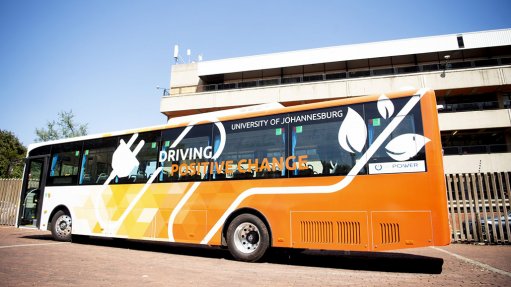
One of the electric buses at UJ
The University of Johannesburg (UJ) has purchased two battery electric buses to ferry students between its various campuses.
The decision to roll out the buses follows a test period last year during which the university used a similar demonstration vehicle as a campus residence shuttle, says UJ special projects adviser Professor Andre Nel.
“Our routes were tested using the demonstration bus, and we are certain the busses have sufficient torque and power for our routes.”
The buses typically make low-speed, start-stop trips, adds Nel, which is ideal for an electric vehicle.
UJ has an existing fleet of 15 buses, with the two new electric buses displacing two diesel buses.
The vehicles are charged using solar energy, which adds to their green credentials.
The supplier of the electric buses is South Africa’s Mi Power, trading as Ramabulana Holdings.
Only the battery packs are imported, with these packs then installed locally.
Each bus has a capacity of 76 passengers, with 57 people seated and 19 people standing.
The buses are fitted with closed circuit television cameras and USB charging ports.
“The commercial advantage of having electric buses far outstrips running diesel-operated buses,” explains Nel.
“The return on investment for the university is immeasurable; it cannot be measured in monetary terms.”
The project to acquire the electric buses started more than 18 months ago, as part of UJ’s drive to reduce its carbon footprint.
“We have always had a strong focus on sustainability,” explains Nel.
After rolling out a large number of solar panels, with 15% of UJ’s energy currently flowing from the sun, the question was what could be done next to further the university’s green ambitions.
The answer was green transport, as transport makes up about 4.5% of UJ’s carbon footprint, says Nel.
UJ says it will have to experience loadshedding for more than five hours a night to impact the overnight charging of the electric buses negatively.
It takes 5.5 hours to charge the busses fully.
The range is 350 km, which the university says is more than the 200 km route the buses cover every day.
There are currently two charge points, one on campus and one at the bus depot.
The vehicles are expected to have a 15-year lifespan, says UJ.